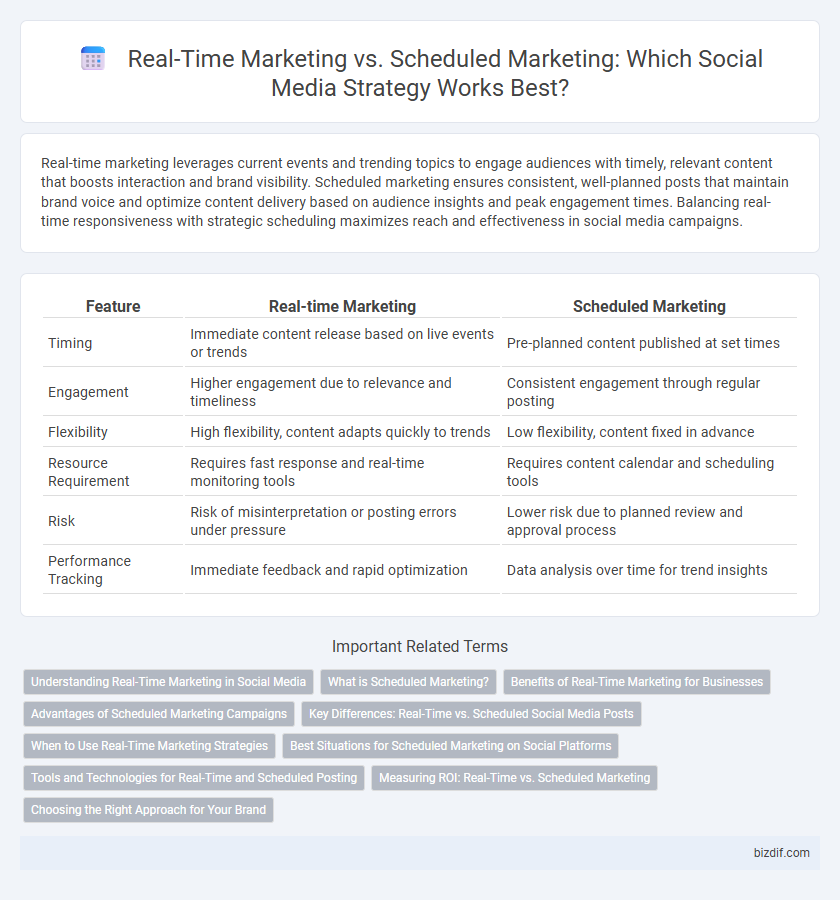Real-time marketing leverages current events and trending topics to engage audiences with timely, relevant content that boosts interaction and brand visibility. Scheduled marketing ensures consistent, well-planned posts that maintain brand voice and optimize content delivery based on audience insights and peak engagement times. Balancing real-time responsiveness with strategic scheduling maximizes reach and effectiveness in social media campaigns.
Table of Comparison
| Feature | Real-time Marketing | Scheduled Marketing |
|---|---|---|
| Timing | Immediate content release based on live events or trends | Pre-planned content published at set times |
| Engagement | Higher engagement due to relevance and timeliness | Consistent engagement through regular posting |
| Flexibility | High flexibility, content adapts quickly to trends | Low flexibility, content fixed in advance |
| Resource Requirement | Requires fast response and real-time monitoring tools | Requires content calendar and scheduling tools |
| Risk | Risk of misinterpretation or posting errors under pressure | Lower risk due to planned review and approval process |
| Performance Tracking | Immediate feedback and rapid optimization | Data analysis over time for trend insights |
Understanding Real-Time Marketing in Social Media
Real-time marketing in social media involves creating and sharing content that responds immediately to current events, trends, or consumer behaviors, maximizing relevance and engagement. This approach leverages social listening tools and rapid content creation to capture audience attention during peak interest moments, enhancing brand visibility and fostering authentic connections. Understanding the dynamics of real-time marketing enables businesses to react swiftly while maintaining brand voice and consistency across platforms.
What is Scheduled Marketing?
Scheduled marketing involves planning and automating social media posts in advance to maintain consistent content delivery across platforms. This strategy uses tools like Hootsuite, Buffer, or Sprout Social to optimize posting times based on audience engagement data. Scheduled marketing enhances brand visibility by ensuring regular updates without the need for constant manual intervention.
Benefits of Real-Time Marketing for Businesses
Real-time marketing enables businesses to respond instantly to trending topics and customer interactions, boosting engagement and relevance across social media platforms. It enhances brand visibility by capitalizing on current events and consumer sentiments, driving higher conversion rates and customer loyalty. This dynamic approach allows marketers to adapt quickly to market changes, outperforming rigid scheduled campaigns in fostering authentic and timely connections with their audience.
Advantages of Scheduled Marketing Campaigns
Scheduled marketing campaigns provide consistent brand presence by allowing posts to be planned and published automatically at optimal times, increasing engagement rates. They enable efficient resource management by streamlining content creation and reducing the need for constant monitoring, thus saving time and effort. Analytics from scheduled campaigns offer valuable insights for refining strategies, improving targeting, and maximizing ROI in social media management.
Key Differences: Real-Time vs. Scheduled Social Media Posts
Real-time marketing leverages instant audience engagement by posting timely content aligned with current events, enhancing relevance and interaction rates. Scheduled social media posts prioritize consistency and strategic planning, allowing brands to maintain a steady online presence through automated publishing at optimal times. The key difference lies in immediacy and adaptability for real-time marketing versus predictability and control in scheduled marketing strategies.
When to Use Real-Time Marketing Strategies
Real-time marketing strategies are most effective during live events, trending topics, or sudden market changes, allowing brands to capitalize on immediate consumer attention and engagement. Brands should leverage real-time marketing to respond swiftly to social media conversations, breaking news, or viral content that aligns with their identity and target audience. Using real-time marketing in these scenarios increases relevance and drives higher interaction compared to scheduled posts that lack immediacy.
Best Situations for Scheduled Marketing on Social Platforms
Scheduled marketing on social platforms excels during predictable events like product launches, seasonal promotions, and holiday campaigns where timing and consistency are crucial. It ensures optimal content delivery across multiple time zones, maximizing reach and engagement without the need for constant manual intervention. Brands leveraging analytics can fine-tune posting schedules for peak audience activity, enhancing overall campaign performance.
Tools and Technologies for Real-Time and Scheduled Posting
Real-time marketing leverages tools like Hootsuite Insights and Sprinklr, which offer instant social listening and automated response capabilities to capitalize on trending topics immediately. Scheduled marketing relies on platforms such as Buffer and Later, providing robust calendar management and content automation for planned, consistent posting across multiple social channels. Advanced AI-driven analytics integrated into these technologies optimize posting times and content relevance, enhancing audience engagement and campaign performance.
Measuring ROI: Real-Time vs. Scheduled Marketing
Measuring ROI in real-time marketing involves tracking immediate engagement metrics such as clicks, shares, and conversions, enabling swift adjustments to campaigns based on audience reactions. Scheduled marketing relies on predictive analytics and long-term performance data to assess ROI over time, focusing on trends and sustained audience growth. Integrating real-time data with scheduled strategies enhances accuracy in ROI measurement, optimizing resource allocation for maximum impact.
Choosing the Right Approach for Your Brand
Real-time marketing leverages current events and trends for immediate audience engagement, making it ideal for brands seeking agility and authentic interaction. Scheduled marketing ensures consistent messaging through planned content, benefiting brands that prioritize steady brand presence and strategic timing. Selecting the right approach depends on your brand's goals, target audience behavior, and resources for monitoring and content creation.
Real-time marketing vs Scheduled marketing Infographic

 bizdif.com
bizdif.com